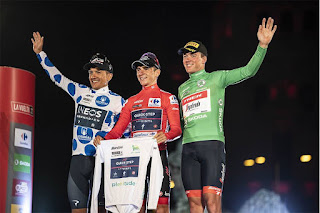Cycling's Third Grand Tour
La Vuelta has always been sort of the redheaded stepchild of
the Grand Tours whether because of its young age or being swapped around on
cycling’s calendar thanks to ol’ Hein Verbruggen. 2022's was no different. There
are still arguments today as to whether it was a better race in the spring
rather than in its current September place on pro cycling’s calendar, but just
like Verbruggen’s other great idea, the World Tour, it seems like pro cycling
is stuck with it.
La Vuelta has not always compared well to its older Grand
Tour sisters, having been won in the past by notable non-three week stage race
specialists like Freddy Maertens (ironically the last Belgian to win before
Evenepoel’s triumph this year) Ireland’s Sean Kelly or even Italy’s Marco Giovannetti.
Recent editions (under the organization of France’ ASO who completed their
buy-out in 2014) have been dubbed “tapas cycling” for the shorter, more intense
stages compared to LeTour or Il Giro. Some like them, I don’t. They make the Vuelta seem almost like it’s being raced on a purpose-built circuit rather than
the roads of Spain, especially when you watch the riders winching themselves up
super-steep climbs on roads that go nowhere while using tiny gear ratios. A Zoncolan, Mortirolo or Planche des Belles
Filles is fine, but in Spain they overdo it.
There’s also been some chicanery over the years like
Robert Millar’s woes in 1985 - he went into the final day with a 6 minute lead
over Pedro Delgago but somehow ended the day with Delgado in the leader’s jersey. Or how 'bout Cadel Evans’ 2009 problems? These make some of the goings-on at the Giro
(think of 2005 with Savoldelli or Fignon vs Moser in 1984) look pretty tame in
comparison.
2022’s edition was also plagued by Covid-19, perhaps more than
either of the other two Grand Tours with just 134 finishers making it to Madrid out of the 184 who started in the Netherlands. Crashes took their toll as well
with contenders for GC, sprints and mountains eliminated by injuries if they
weren’t sent home with Covid, but there was no shortage of "best young rider" candidates.
But “the kids are alright!” as they say, with Evenepoel
finally living up to the hype as the newest-latest Eddy Merckx, taking two stage wins and the overall title followed by Enric Mas at
the ripe-old age of 27 and Juan Ayuso at just 19 years old! The rest
of the top ten were all under 25 with the only old-guy up there Rigo Uran at 35,
almost a decade older than the rest. Why not a “best old-guy” jersey? Should
it be gray? Think of the sponsorship possibilities - hair coloring, laxatives, pain-relievers, pension-funds and more!
TV coverage gets my usual gripes about a director who misses
the attack and has to go back to replay, then misses another attack or spends way too much time with
scenery shots at the expense of racing action. I didn’t watch every stage here in Italy on Eurosport as we
were traveling, but this did let me see some of the US coverage when they showed
it free on the weekends. On that note, while Bob Roll and Christian Vandevelde
are probably nice guys and certainly know their stuff, one of them is
redundant. The broadcast needs an expert broadcaster along with a technical expert
rather than two tech experts/amateur broadcasters who talk over each other far
too often and sometimes forget that not all the viewers are experts like they
are. I was never a fan of Liggett/Sherwen but have to admit they worked well together. The folks that sign the checks for Roll/Vandevelde should take note.
When the race arrived in Madrid I found it hard not to have a sense of “what-if” since contenders like Carapaz lost time early and defending champ Roglic
crashed out, but it’s also hard not to say CHAPEAU to young Remco even if he
appears somewhat robotic. The same can be said of Vingegaard but the Dane’s not
laboring under that “new Merckx” label, one that’s ruined the careers of plenty
of other post-Merckx Belgians. Young Remco beat everyone who showed up at the
start line so even if he’s not the most exciting, he’s still a deserving winner.
I think Evenepoel fits into a category I call a “science
project rider" (similar to Vingegaard, both in that "Kite-Man" mold that I dislike so much) which is a guy with amazing watts/kg (VO2max
or whatever you want to measure) taught to ride a bicycle reasonably well, then programmed through a radio earpiece and protected by a crack team of
experienced pros.
The result is not a lot of panache or passion and maybe even a bit of Frankenstein but perhaps this is modern World Tour cycling and the best we can hope for? But then there’s Pogacar (or Ayuso) so let’s see what the Vuelta champ does in a couple of weeks as part of the Belgian team at the World Championships.
Robotic winner, whining brat or dutiful teammate helping odds-on favorite Wout
VanAert? He’s young enough there’s still time to find his place and define the
kind of racer he is.
Click HERE for another take on the race. And HERE for one that points out how successful the "Mow 'em down in the chrono, defend in the mountains" strategy still is.


No comments:
Post a Comment